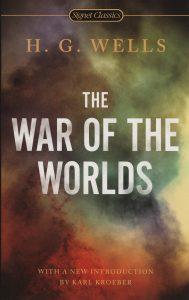“No one would have believed in the last years of the nineteenth century that this world was being watched keenly and closely by intelligences greater than man’s and yet as mortal as his own.”
And so began one of the most influential science fiction novels to date.
The War of the Worlds was H. G. Well’s fifth novel, and one of four that he completed during his stay in Woking, Surrey. Originally labelled as ‘science romanticism’, it addressed many 19th century issues at the time. The novel is an interpretation of imperialism, Victorian values, and the effects of colonisation on indigenous people.
A relatively simple story, it’s been adapted into multiple films, plays, and radio broadcasts since the late 1800s. It even inspired American scientist Robert H. Goddard to invent two of the types of rockets later used in the Apollo moon landing.
Summary
The story is in a first-person perspective as the unnamed narrator becomes intricately involved in an alien invasion. Martians attack his hometown, incinerating all those who stand in his way, and he only just about manages to get his wife to safety before the aliens take over. The novel follows his journey through England as he desperately searches for his wife once more, avoiding heat rays and machines at every turn. The Martians are powerful and slaughter all those who stand in their way. It’s up to the narrator to win the ongoing war.
Commentary
The War of the Worlds was revolutionary in its time, as the science fiction genre wasn’t even yet invented. In the modern world, however, it can seem overly simplistic.
Praise
- It’s a very well-written novel with thrilling dialogue and surprisingly insightful moments of philosophy. Wells manages to expertly combine the terrifying realities of life with theoretical musings of a desperate man.
- It’s as realistic as possible while still staying true to the science fiction genre. Each battle is vividly described, the reactions of each character are entirely plausible, and the ending is the best possible ending that Wells could have ever written.
- The novel teaches us about our own humanity. The alien invasion is used as a metaphor for the British invasion of Tunisia at the time. There was imperialism and mass genocide and Wells decided to write a book about how the British would feel if it was them being invaded by a so-called ‘superior’ race. He does not disappoint.
Critique
- Some parts of the novel can get quite dull. Although Wells blends the facts with philosophy quite well, the philosophy sections occasionally drag on a bit.
- The ending is very much a ‘love it or hate it’ scenario. It’s realistic and entirely possible, but somewhat anti-climatic. After pages upon pages of suspense and hiding and sitting on the edge of your seat trying to figure out what happens next, the ending is abrupt. Very abrupt.
- The narrator is a very flat two-dimensional character. He doesn’t have a name or much of a personality, and if he had been anything other than the main character, he would have been forgotten immediately. The reader doesn’t learn anything about him asides from the fact that he has a wife and brother, both of whom are also nameless.
Recommendations
Overall, I’d give H. G. Wells’ The War of the Worlds a four out of five. It’s the grandfather of all science fiction and has been the basis of many famous films.
I’d recommend this novel to absolutely everyone. It’s barely one hundred pages long, tells an interesting and compelling story, and is the perfect introduction to the science fiction genre.

Want to read it for yourself?
Prefer to listen instead?
